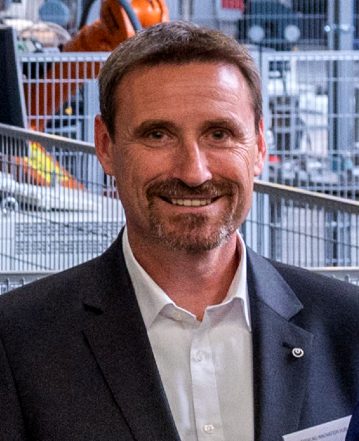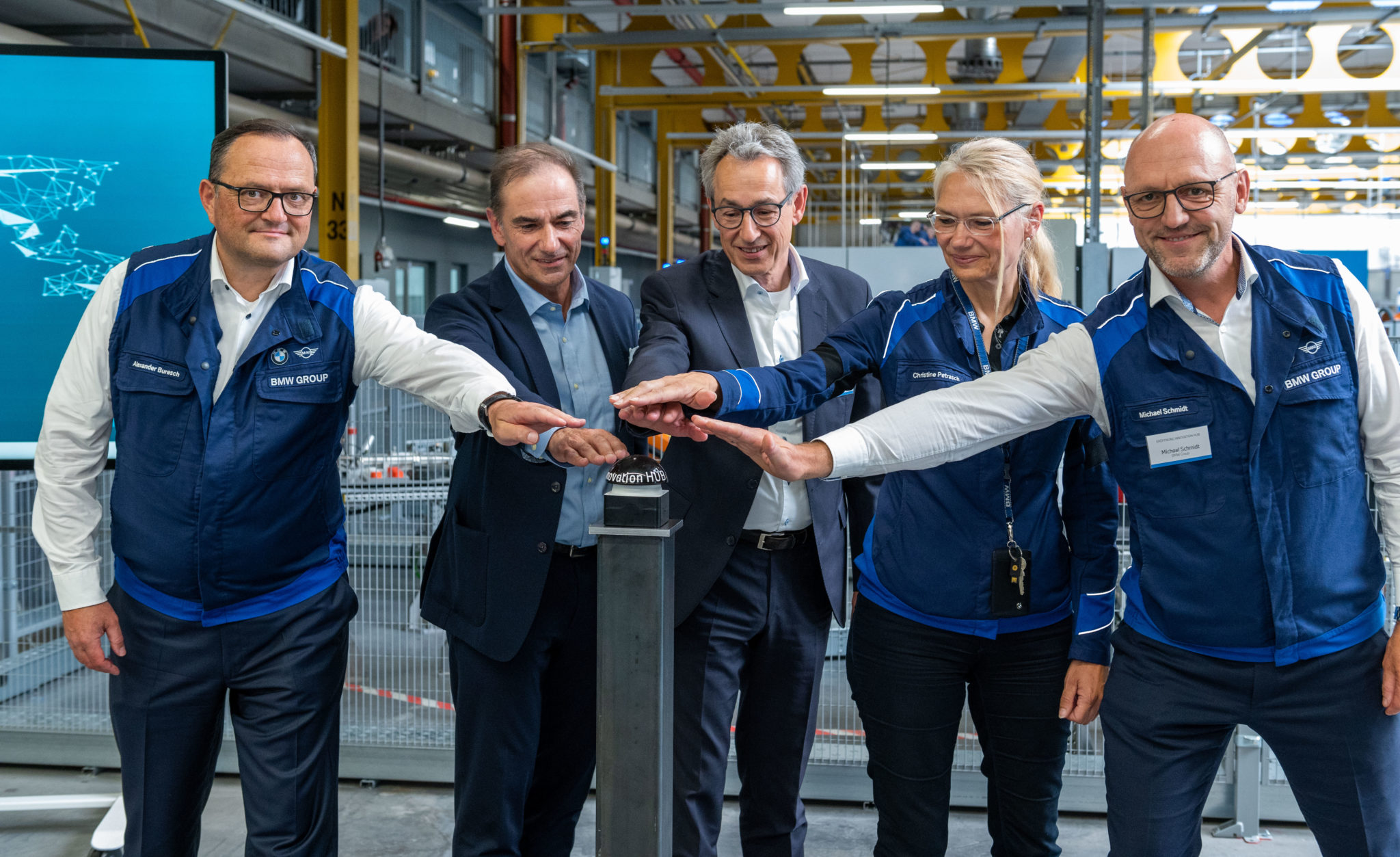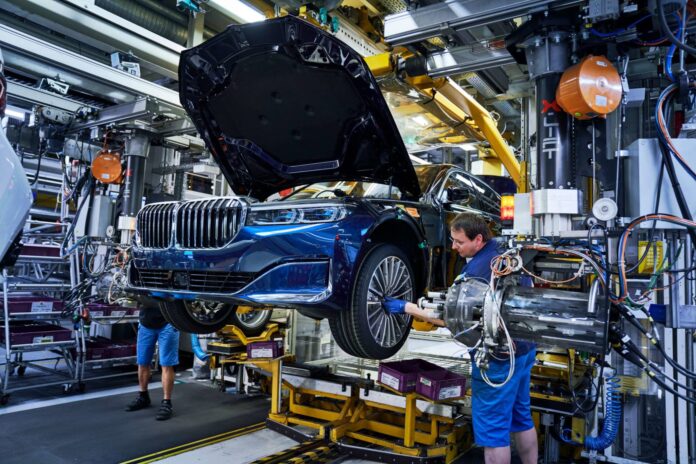NTT is making waves in the private 5G market right now; deals with BMW on a test installation at its production site in Dingolfing in Germany and with local airport operator Fraport on a major commercial engagement at Frankfurt Airport (which followed a parallel project at Cologne Airport), are genuine head-turners so far as the Industrie 4.0 market in Germany goes, and prized big-ticket gigs in the global private 5G supply sector.
A couple of weeks back, before summer disrupted everything, NTT’s management team in Germany, in charge of the new work with BMW and Fraport, stopped to talk with Enterprise IoT Insights about the state of the market and the nature of the deals. Kai Grunwitz, chief executive of NTT in Germany, and Marcus Giehrl, the company’s director of digital transformation, chatted candidly for 30 minutes, explaining the premise of their work, and its journey to scale.
The pair talked about differences between using and scaling 5G in airports and factories, the floodgate momentum and inherent conservatism in the home of Industry 4.0, and why trust is the deal-breaker for the supply of new 5G-based industrial IoT systems. They even reference Faust – raising the idea, indirectly, that digital change is a trade with the devil, where a stake in a factory (the soul, or some infrastructure management) is given for high-fidelity digital artistry (self-knowledge, or howling blues mastery, depending on your crossroads motif).
Either way, the deal is made on trust, and the draw is irresistible. The transcript is below; the speakers are named in each answer. More on the BMW and Fraport deals can be found here and here, respectively.

…
Just to start, give us the NTT pitch on private 5G – how you see the market, and your position within it?
Grunwitz: “So we are a connectivity partner for digital change within many enterprise clients, and 5G is the new nerve system for the digital shop floor – wherever that might be. For this new future of digitisation, nothing works without 5G. And NTT has invested massively in the last 12 months to build up the capabilities and solutions to cope with requirements on the client side. But it has not come out of nowhere.
“Ours was a strategic and well-planned approach to build [private 5G] offerings that give customers the freedom of choice to run enterprise cellular as-a-service. or as an integration solution where the client takes more ownership, and also to understand the business drivers for clients like BMW and (Frankfurt Airport operator) Fraport – as well as Cologne Bonn Airport in Germany, which we signed with some months prior.”
Talk about the work with BMW – what, why, how?
Grunwitz: “So the project fits with our strategic direction – to connect everything on the shop floor, from the edge to the cloud. Everything is moving to a cableless production environment, with connected robots, and multiple devices and sensors – and you need a solution to bring it all together. This was the discussion from the start with BMW. Because BMW, like the whole automotive industry, has to change the way it produces cars.
“The car industry is in a process of transformation; car makers need tech solutions to support that journey. We started talking with BMW, together with Intel and Microsoft, more than a year ago; there was a period of gestation, and then it came to life. Because BMW needs to modernise the digital infrastructure in its production plants – to work with cloud and edge [apps], artificial intelligence, OT/IT convergence.
“The business departments in BMW struggled to find a safe-harbour environment to test these Industry 4.0 use cases. Because you can’t just test in live production. That’s not going to work. So it is in the innovation hub, right next to the production plant – and where BMW has its training centre, as well, for apprentices and internships and so on, to help to educate new staff on the latest technologies in parallel. So it’s a win-win.”
How are the Fraport and BMW deployments different? Automotive manufacturing is considered to be both progressive and conservative – and the 5G standard is also not fully specified for critical industry, as yet. Airports, on the other hand, are better positioned to take advantage of 5G, as it is standardised today – for more broadband-like services. Is the business case / logic easier for airports at present?

Grunwitz: “They are different, but it is the same business case, so far as 5G goes. 5G is just a technology – another way to connect OT infrastructure and machines. The real benefit will only come with the right use cases, and BMW is an innovation hub, set to bring those to life. It wants to create new things. On the airport side, clients want tenable outcomes, specifically in these cases to improve the apron environment.
“Which means fewer cables, better safety, autonomous vehicles, drones, and so on. But the infrastructure is always the starting point. Without it, you can’t build the use cases. In Frankfurt and Cologne, it was important to create use cases that can quickly find a way into the production environment, and into airport operations. That has been a clear objective. While BMW is trying to create the factory of the future.
“At the same time, BMW’s strategy is a global one; the mission is to go from Dingolfing to the rest of the world. Dingolfing is a BMW production incubator for future manufacturing tech, and the plan is to go to all of its production sites. It is a big honour to be part of that journey.”
Giehrl: “I agree with your statement to a certain extent. It is a little easier for airports to leverage 5G right now because their focus is just on coverage – which you can achieve with the current 5G release. Which has helped with some quick successes. BMW has already deployed 5G at its factories in China, since 2019. But there is lots to come from 5G for manufacturing. Many industrial 5G specifications are more-or-less on paper, for now.
“And there are difficulties for Industry 4.0 as well with the availability of industrial-grade devices and chipsets, and all that stuff. So that remains a challenge for manufacturing – which BMW wants 5G to address in production, as well. Whereas airport customers can more easily leverage the traditional benefits of high quality outdoor coverage with only a handful of antennas – which no other wireless technology can do.”
So bearing in mind the industrial 5G schedule, commercialised in devices in 2024/25, what is your sense of BMW’s timing to scale the Dingolfing projects into other sites?
Grunwitz: “We cannot speak for BMW, clearly. We are just one partner, after all; it is a BMW innovation hub. We have co-invested, but the speed, and direction is all by BMW. We will introduce ideas – thoughts about what might be targeted first, but it is for BMW to say. At the same time, BMW has emphasised the relevance of the hub for its global production strategy. And the view is 5G is in a position to start to accelerate the Industry 4.0 story. Which is right. Industry 4.0 has been talked about forever, but we are now in a position to roll it out.
“And the Dingolfing rollout took only a few weeks from receipt of the infrastructure to building the use cases. But 5G is not something you do in isolation, and the BMW innovation hub is not just for 5G. NTT is clearly focused on the connectivity side – because that’s our heritage. But we will also introduce more capabilities around use case creation via our sister company, NTT DATA, and then BMW is bringing completely different skills to the table, and we will all work within a [safe harbour within a] real production environment.”
Does NTT have people on site in Dingolfing permanently? Or is it, more likely, a more flexible model, where NTT consultants come and go?
Giehrl: “It is a big space – 200 square metres, roundabout. There is a meeting room, and space to run workshops and so on. We have put the whole infrastructure into it – the server rack with the 5G installation; there are other modern IT servers around, which we can use locally, completely dedicated to the hub. So it is a really creative [digital] work environment, which goes on top of what’s already there – the training centre, plus all the elements BMW uses in production.
“Because it is for apprentices to learn, as well – to test and train. They are going for two or three years to learn BMW stuff. So the hub combines real production equipment with the new tech we are bringing. And our team can go there to help to define these new Industry 4.0 use cases with BMW, and to run each as a project – with a fixed team from BMW, and some from our side, which are perhaps not permanently there, but can go there and work hands-on. That is the concept.”

And how would you say, as best you can, that this compares with all of BMW’s other LTE/5G-based Industry 4.0 projects and experiments? Is it the most significant, at least in Europe?
Grunwitz: “It is one of many – and one of many, also, in Germany, at large. That’s all we can say; again, it is a question for BMW. But we have a study about how the wider private 5G market is developing, which says half of the industry leaders – within BMW’s wider supply chain, and all through the manufacturing industry – plan to implement a private 5G solution or else are already in the process of deploying one. And Germany is leading that trend in the Industry 4.0 space.”
So about the Industrie 4.0 scene in Germany: clearly, Germany has been relatively quick and decisive with ‘vertical’ spectrum, and is home to many major industrial brands, which will likely lead the global Industry 4.0 charge, to an extent; but Deutsche Telekom, for example, has also said the industrial 5G movement in Germany has been slow, so far. Which will be about this issue with the standard, as well. Which ties in with what Siemens, for example, says, about a 2024/25 timeframe for this stuff. What is your sense of this?
Grunwitz: “We see a strong trend in Germany. I think it is moving fast. Well over 200 companies have now registered for 5G licences – according to BNetzA. And there is clear regulation they need to show progress to use the spectrum within one year of taking the licence. So these firms are only going to ask for a licence if they have proper plans in place, already, to use it. So that is important, and shows momentum.
“But some companies are concerned about the economic environment, which impacts how fast they will move on this stuff. Sometimes it is a question of whether you want to be a first mover, an early adopter, or an early follower. That is always a debate for these customers. Cologne Airport, say, was very clear it wanted to lead this market – it wanted to go first and set the pace. Where Frankfurt wanted to go next, as an early adopter.
“Because Cologne had opened the floodgates. We have had way more conversations since these first reference cases came out. Because companies see others doing it and don’t want to fall behind. So, yes, there is some inherent conservatism, but just the number of licences shows momentum is building. The wave has built, and we will see the tech outcomes are way better than a year ago.”
Giehrl: “Yes, I think there is this typical German conservatism. You always need a first mover, and then it becomes a use-case topic, rather than just about technology. If one airport does it, and has success, then others will follow. But the successes don’t necessarily transfer between industries. It might be the technology transfers quite well, in terms of knowledge and experience, between manufacturing and healthcare, say.
But, emotionally, a hospital will never just buy something that is only proven in a factory. Everybody wants to feel special. And there is always more work to do to deliver different use cases for different industries. So in each and every industry, you need that first mover and then others will follow. And that is more or less where we are in the market now – with these first movers and early adopters.”
Grunwitz: “And like I said before: you need to invest first in the infrastructure at the start, because you can’t just have an idea of the use cases without an environment to test them in. Sometimes it is a chicken-and-egg problem; people want the business outcome from day one, but you need the network first. So companies have to be very clear with their business case. It is the same for all of these big change projects – it is never an IT project; it is always a business project.”
On the regional picture: you mentioned BBA in China, and I’ve just got off the phone about the China market, and this perception that China market is running away with private 5G, compared with the rest of the world – and the point made to me is that most of the private network in China are running off public telco infrastructure. Unlike the Fraport and BMW model – which will be completely private, completely edge. Which is what (at least the first-adopter part of) European manufacturing wants. And so the idea is the 5G/Industry 4.0 market in China is a little skewed. Is that what you see also?
Giehrl: “Yes. We can’t really comment, but that is what we see and hear – that the only way in China, really, is to work completely with mobile network operators”
Okay, and just explain why BMW and Fraport, and others, are going with NTT? You mentioned the speed of the deployment, the flexibility of your solution; some of these kinds of things. But why NTT? And also, as a second part, can you just say who is the RAN provider in these deployments?
Giehrl: “On the second part: we are working with different providers. We are vendor agnostic, more or less. We won’t work with anybody and everybody, but we have a selection of partners. The setup at the airports is similar – just because they tend to want this kind of copy-and-paste version, where the second customer can build on the trust [wth partners] the first has already established. They are both running with Microsoft and Airspan – where you have to do the integration yourself. BMW is using the all-in-one Celona product, which has an integrated radio part.”
Grunwitz: “On the first part, the important thing is we have a long experience with both cellular and IT. And with private 5G, you need a partner that covers both sides. So that is one thing. And we have also demonstrated we can manage such an environment. Which is important because IT experts in many companies do not tend to have the broad knowledge to manage a 5G environment.
“It requires different skill types, and it is not their core competency. So when we announced we were offering private 5G as a managed service, it was really appealing for BMW, and for others – to know they have a partner that can really handle [the network] on their behalf, so they can focus on their core stuff, around industrial production, building cars, and transforming the car industry. That is very important to understand.
“So it is all of those things – our expertise with carrier and IT knowledge; and our global reach, to deliver the same service experience all around the world. Which is really different to other players that are focused on one region. The other thing, at least with BMW, is we have a long term relationship with it already – for 30 years. So we are just extending an existing collaboration, to go to another level, to address another topic. The trust is already there.
“And then, a key in all the conversations has been to build it fast, and staff it with experienced people. Because a lot of IT providers in this space are starting from scratch with 5G – where we have already worked with carriers, and we are a carrier ourselves. Plus we have the IT capabilities anyway, plus the whole ecosystem around use cases and best practices has been implemented already in Japan. Which we can bring to Germany.
“Those are real differentiators for us, in all the conversations we are having around private 5G. It is all about trust and knowledge and experience. And I have been in all the discussions, and the question is always the same: ‘can we trust you?’ It’s like Faust and the devil, in Goethe. ‘Can I trust you?’ ‘Can we trust NTT?’ It comes down to a matter of trust, and global experience with connectivity.”
Just quickly, before time is up: you mention that BMW wanted a managed service, but the perception originally, 18 months or two years ago, was that the big hardcore manufacturing companies that lead this adventure will want to manage the network themselves. Is your view that, actually, when this comes out, they won’t – that they will want somebody else to manage it for them?
Grunwitz: “I am not sure yet. We don’t know. We will manage it in the test environment, in the BMW hub, and we will see how it works. We already do the same for other companies, too. And in my opinion, most companies, as soon as they see how it runs, will choose not to run it themselves. Because they have limited resources. So I would bet on a managed solution for the future. Everyone wants it to be managed by experts. It is critical, after all. But let us see, as the market develops.”

